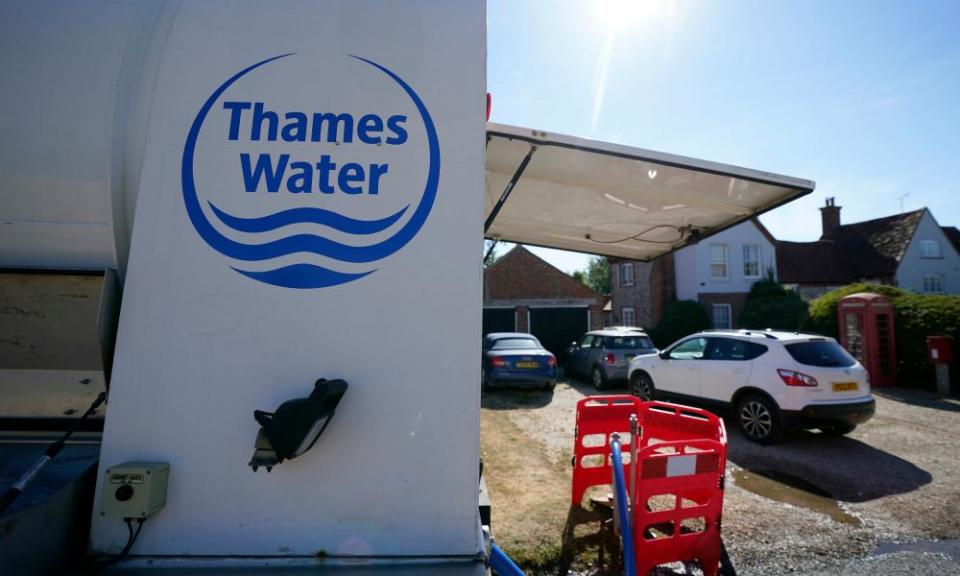Here’s a bright idea to improve accountability in the water sector

To the surprise of nobody who follows the English and Welsh water sector, the two companies that have been hit with the heaviest penalties for missing performance targets this year are the usual suspects: Southern Water and Thames Water. The dirty duo last year had to return £99m between them to customers after Ofwat’s annual tally of outcomes in areas such as water supply interruptions, pollution incidents and sewer flooding. This time the figure is £80m.
The top end of the league table, note, is also familiar. Severn Trent and United Utilities outperformed targets, as last year, and thus get rewarded by being allowed to recover more money via bills (which may feel less rewarding from the point of view of customers). Correlation doesn’t always imply causation, but it’s worth asking: do different ownership models help to explain the persistent gulf in operational performance?
Related: Water companies forced to cut £150m from customers’ bills
Southern and Thames were two of the firms that were loaded with debt during the private-equity-led takeover boom soon after the turn of the century. Severn Trent and United escaped that fate and are two of only three big water firms still listed on the stock market, where games of extreme financial engineering are harder to perform.
Certainly, Jonson Cox, who in June stepped down as chair of Ofwat, seemed to join the dots in front of a Lords select committee last month. He bemoaned the old regulatory mantra that said capital structures were for companies to determine, and he took a swipe at investment banks for the role in the takeover and high-leverage spree of the 2000s.
First, it created “the predisposition of thinking of water companies as financial assets”, he argued. And, second, risks were made asymmetric: leverage juices up equity returns for owners when things go well, but the costs fall on customers when they don’t. It was not a surprise, said Cox, that three of the most highly leveraged structures ran into difficulties. “I regret there aren’t more publicly listed companies because it gives real visibility,” he said.
Ofwat must also be blamed for general timidity, of course. The industry’s replacement of equity with debt, and extraction of dividends, happened under the nose of regulators. In the Lords session, Cox congratulated himself and Ofwat for forcing a change of ownership at Southern last year (though it is still in private hands) and a recapitalisation at Thames but skipped over the fact that those changes happened only years after a stink was obvious to everyone.
But he was probably on to something in turning the spotlight on ownership structures. On that score, an intriguing idea has been pitched by Jonathan Ford, podcaster (A Long Time in Finance) and former FT leader writer: all the big privatised water companies should be listed on the London Stock Exchange; and it should be a condition of holding a licence that at least 25% of the shares are publicly traded.
The proposal is obviously not a cure-all for faults that have been 30 years in the making, but even fans of nationalisation (who might reflect that sometimes, like now, a cost-cutting government would be in charge) should consider the advantages. Highly leveraged structures would have to be dismantled on return to the stock market, thereby injecting capital and forcing managements to think more about running their companies better. Owners would protest, but so what?
And transparency should improve, since it is harder to hide when you’re in the glare of a regular six-monthly reporting cycle and have to publish financial accounts that ordinary mortals can understand. Excessive boardroom pay, admittedly, might not change one jot, but that’s another story.
Some political party or other should take up the stock market idea. It’s not perfect, but quoted status imposes a certain discipline and accountability on boards. If results are usually better too, parliament should just make it happen.
Spare us the sermon, Vodafone
The old thinking said four large mobile operators was the minimum needed to ensure competition in the UK market. Now comes the latest attempt to test the regulatory breezes: Vodafone and Three, which is owned by CK Hutchison, want to combine their UK businesses.
Has the landscape changed radically since a Three-O2 combo was blocked in 2016? That’ll be the argument. Vodafone’s confirmation of talks contained a mini-sermon on how the rollout of 5G companies required companies to earn their cost of capital.
The claimed customer-friendly benefits would be easier to swallow, however, if BT’s share price had not risen 4.4%, presumably on the prospect of less price competition for its EE operation. A full Competition and Markets Authority inquiry is essential: these mergers, once done, are impossible to undo.

 Yahoo Finance
Yahoo Finance